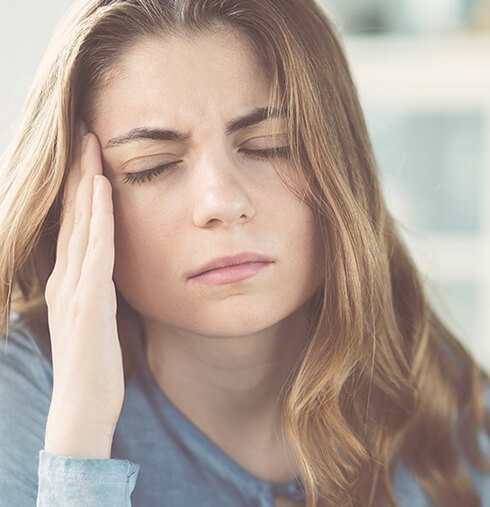TMJ Treatment
in Austin & Round Rock, TX
Do you ever wake up with pain in or around your jaw, or find it difficult to eat or open and close your mouth without jaw stiffness and soreness? You may have TMJ, or temporomandibular joint disorder, which is when chronic teeth clenching puts pressure on the jaw joint and causes a variety of symptoms. While it may be just an occasional nuisance, it’s important to discuss your symptoms with your trusted Austin or Round Rock dentist to see if treatment is necessary. Contact us today!
Contact Us
What is TMJ?
TMJ refers to a complex disorder that affects the temporomandibular joint, which connects your jawbone to your skull. This joint is responsible for essential movements like talking, chewing, and even yawning. When the joint and surrounding muscles experience dysfunction or discomfort, it’s referred to as TMJ disorder. TMJ is often temporary, but it can also be a chronic condition that affects the patient’s life on a regular basis. It’s important to seek treatment for TMJ, as it can result in irreversible tooth, gum, and jawbone damage if left untreated.

What are the symptoms of TMJ?
Symptoms of TMJ can vary widely and may include:
- Jaw Pain: Persistent or intermittent pain in the jaw joint or muscles around the jaw.
- Jaw Clicking or Popping: Audible sounds when opening and closing the mouth, often accompanied by discomfort.
- Limited Jaw Movement: Difficulty fully opening or closing the mouth.
- Headaches: Recurring tension headaches or migraines, often stemming from jaw muscle tension.
- Ear Pain: Earaches or discomfort in the ears, often without signs of infection.
- Neck and Shoulder Pain: Pain or tension in the neck and shoulders due to muscle strain.

What causes TMJ?
TMJ is often influenced by stress and anxiety and can be triggered by stressful life events. It can also be caused by misaligned teeth or a misaligned bite, in which case treatment would likely include orthodontic care. Other causes include arthritis, a jaw or head injury, and poor posture. Our team would be happy to assess your symptoms and lifestyle to determine if a custom nightguard can help protect your teeth at night and reduce and relieve your symptoms during the day. Contact our office to learn more today!


